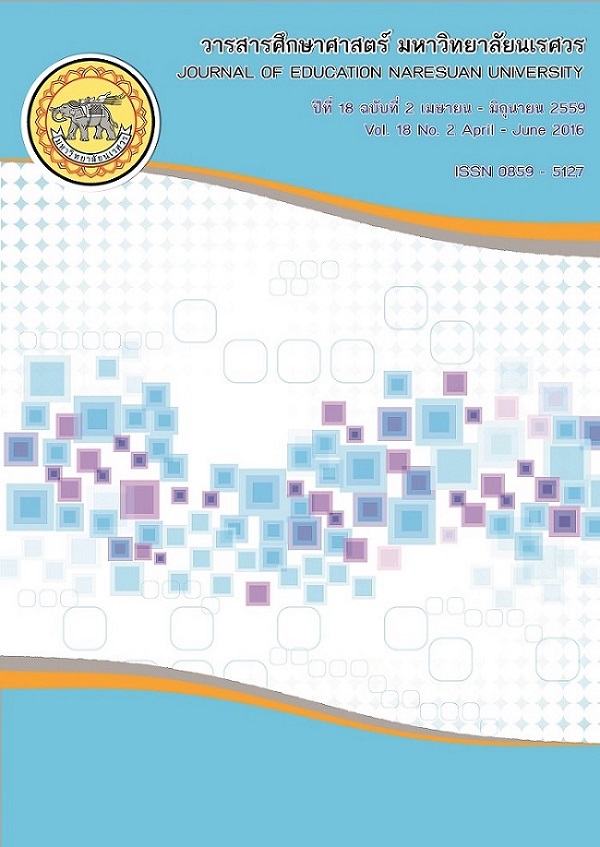ความคิดเห็นของครูวิทยาศาสตร์ที่มีต่อจินตนาการทางวิทยาศาสตร์เพื่อการจัดการเรียนรู้วิทยาศาสตร์ในชั้นเรียน
Main Article Content
บทคัดย่อ
บทคัดย่อ
จินตนาการทางวิทยาศาสตร์ช่วยส่งเสริมการเรียนรู้วิทยาศาสตร์อย่างมีความหมายและช่วยให้เกิดการเรียนรู้อย่างมีประสิทธิภาพแก่ทั้งผู้เรียนและผู้สอน งานวิจัยนี้เป็นงานวิจัยเชิงสำรวจมีวัตถุประสงค์ เพื่อศึกษาความคิดเห็นของครูวิทยาศาสตร์ที่มีต่อจินตนาการทางวิทยาศาสตร์สำหรับการเรียนรู้วิทยาศาสตร์ในชั้นเรียน ผู้เข้าร่วมในการตอบแบบสอบถามคือครูผู้สอนวิทยาศาสตร์จำนวน 274 คน ที่สอนอยู่ในระดับการศึกษาขั้นพื้นฐาน (ประถมศึกษาปีที่ 1- มัธยมศึกษาปีที่ 6) โดยใช้วิธีการสุ่มอย่างง่าย การสุ่มแบบเจาะจง และการสุ่มแบบบังเอิญ แบบสอบถามความคิดเห็นของครูวิทยาศาสตร์ที่มีต่อจินตนาการทางวิทยาศาสตร์สร้างโดยผู้วิจัย เพื่อเก็บรวมรวมข้อมูลเชิงปริมาณและเชิงคุณภาพ ผลการวิจัยพบว่า ครูวิทยาศาสตร์จำนวน 269 คน (ร้อยละ 98.2) 270 คน (ร้อยละ 98.5) และ 268 คน (ร้อยละ 97.8) คิดว่าจินตนาการทางวิทยาศาสตร์มีความสำคัญสำหรับครู นักเรียน และการจัดการเรียนรู้วิทยาศาสตร์ในชั้นเรียน ตามลำดับ นอกจากนั้น ครูวิทยาศาสตร์จำนวน 212 คน (ร้อยละ 77.4) เห็นด้วยกับคำกล่าวของไอน์สไตน์ “จินตนาการสำคัญกว่าความรู้” โดยนักเรียนที่มีจินตนาการทางวิทยาศาสตร์สามารถแสดงออกได้ 3 ลักษณะ คือ ลักษณะทางด้านบุคลิก ลักษณะทางด้านการคิด และลักษณะทางด้านทักษะ ผ่านวิธีการเรียนรู้ที่หลากหลาย โดยวิธีการจัดการเรียนรู้ที่สามารถส่งเสริมจินตนาการทางวิทยาศาสตร์ ตามความคิดเห็นของครูวิทยาศาสตร์ ได้แก่ การจัดการเรียนรู้แบบโครงงาน การจัดการเรียนรู้โดยใช้การทดลอง การจัดการเรียนรู้แบบสืบเสาะหาความรู้ การจัดการเรียนรู้โดยใช้กระบวนการกลุ่ม และการจัดการเรียนรู้โดยการบรรยาย
คำสำคัญ: ครูวิทยาศาสตร์, จินตนาการทางวิทยาศาสตร์, การจัดการเรียนรู้วิทยาศาสตร์
IN-SERVICE SCIENCE TEACHERS’ VIEWS TOWARD SCIENTIFIC IMAGINATION FOR SCIENCE LEARNING IN THE CLASSROOM
Scientific imagination can promote science learning to be more meaningful and effective for learners and instructors. This study is a survey research and aims to investigate in-service science teachers’ views toward scientific imagination for science learning in the classroom. The participants were 274 in-service science teachers who teach in the basic educational level (Grade 1-12) selected by purposive, accidental and simple random sampling. In-service science teachers’ opinions toward scientific imagination questionnaire used in this study was developed by the researchers for collecting both quantitative and qualitative data. The results revealed that 269 (98.2 %), 270 (98.5 %), and 268 (97.8 %) in-service science teachers thought that scientific imagination is important for science teachers, students, and science learning in the classroom, respectively. Moreover, 212 (77.4 %) in-service science teachers agree with Albert Einstein’s famous quote “Imagination is more important than knowledge”. Furthermore, regarding to in-service science teachers’ opinions, they thought that students who have scientific imagination express their characteristics in three aspects which are personality, thinking and skills through a variety of learning methods. In addition, scientific imagination can be promoted using project-based learning, scientific experimentation, inquiry-based learning, group process and lecturing as the ways of learning.
Keywords: In-service science teachers, Scientific imagination, Science learning
Article Details
เจ้าของบทความมิได้คัดลอก หรือละเมิดลิขสิทธิ์ของผู้ใด หากเกิดการละเมิดลิขสิทธิ์ ไม่ว่าวิธีใด หรือการฟ้องร้องไม่ว่ากรณีใด ๆ ที่อาจเกิดขึ้นได้ กองบรรณาธิการวารสารศึกษาศาสตร์ ไม่มีส่วนเกี่ยวข้องทั้งสิ้น ให้เป็นสิทธิ์ของเจ้าของบทความที่จะดำเนินการ


